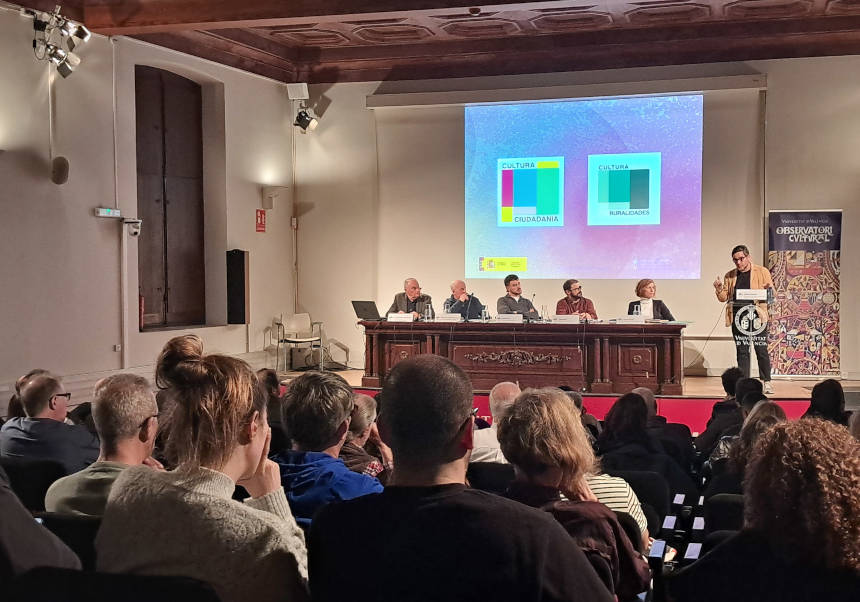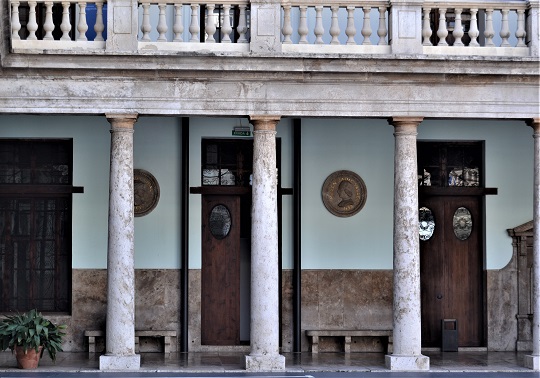The 11st Joan Fuster’s Conference analyses irony on his works
- November 9th, 2016

The Joan Fuster Chair of the Universitat de València devotes the 11st Joan Fuster’s Conference to the study of irony on his works. The conference will be held on Thursday 10 November, from 9:30 to 19:30, in the Casa de la Cultura of Sueca and in the Espacio Joan Fuster. Several specialists will present detailed visions about very significant parts of this topic in the “Fusterian” writing and thought.
The Joan Fuster Chair of the Universitat of València, in the framework of the collaboration with the City Council of Sueca, has wanted to devote this year the monographic study to the topic “Joan Fuster and irony”, in the 11st conference which is periodically devoted to the study, revision and discussion of specific aspects of Joan Fuster’s works, his figure, the subjects he treated sometime related to certain fields and a central focus on his thoughts.
Irony has currently become a central aspect in contemporary writing. Throughout the 20th century it has been a fundamental aspect in writers and intellectuals of different literatures. Only in the field of Catalan literature it has been specially relevant in different historical moments throughout the 20th century and in different literary genres. Poets such as Josep Carner, Vicent Andrés Estellés or Pere Quart; novelists as Carles Soldevila or Llorenç Villalonga; playwrights as Joan Oliver; or essayists as Eugeni d’Ors, Josep Pla or Joan Fuster are obvious examples. It is therefore an aspect of utmost importance for the participants, to make them aware of the greatest work of the great Valencian author.
Joan Fuster i Ortells (1922-1992) is the most relevant intellectual and essayist of the Valencian Country in the contemporary era and one of the main personalities of the Catalan culture of the 20th century. Graduate in Law in the Universitat de València, he soon started to regularly collaborate with the press and at the same time he showed an interest for poetry as his first literary inclination. During those first years, his first poetry books appeared, such as “Terra en la boca” (“The Earth in the mouth”) in 1953 or “Escrit per al silenci” (“Written for the Silence”) in 1954.
As soon as he abandoned poetry, he became professional through writing as a journalist in different media, firstly in Valencia and later in Barcelona or Madrid —La Vanguardia, Jornada, Levante, El Correo Catalán, Destino, Serra d’Or, Informaciones, Tele/eXpres, Avui, El País…—, as well as in the press in the exile, always with a clear determination of having a direct impact on the social reality of the Catalan language and culture.
Concurrently to the task of Fuster as journalist, the erudite person and the exceptional essayist was growing up, as can be seen in his first published essay, “El descrèdit de la realitat” ("The Discredit of Reality”) (1955). With this work he starts his discourse between scepticism and corrosive humour applied to daily life and morality, a point of departure that the author knew to maintain in more than sixty books and during almost forty years of production.
The richness and diversity of topics and aspects analysed in his works enable, in spite of this, to classify them mainly in three areas of interest: humanistic essays, studies on cultural history and socio-political writings. Among the humanistic essays we can mention “Les originalitats” (“Originalities”) (1956), “Diccionari per a ociosos” ("Dictionary for Idlers") (1964), the aphorisms “Judicis finals” ("Final Judgments") (1960) or the diaries “Causar-se d’esperar” ("Causing Oneself to Wait”) (1965) or “Diari 1952-1969” ("Day-to-Day Works"). With regards to his works of cultural and literary history, we can highlight “Poetes, moriscos i capellans” ("Poets, Moorish and Cures”) (1962), “La Decadència al País Valencià” (“The Decline of the Valencian Country) (1976), “Literatura catalana contemporània” ("Contemporary Catalan Literature”) (1972) o “Contra el noucentisme” ("Against Noucentisme") (1977). Among the socio-political writings there are works such as the emblematic “Nosaltres, els valencians” ("We, the Valencians") (1962), “Qüestió de noms” ("Matter of Names”) (1962), “Un país sense política” (“A country without politics”) (1976) or “Destinat (sobretot) a valencians” (1979). “Devoted (mainly) to the Valencian” (1979). He also wrote some travel guides such as “El País Valenciano” (“The Valencian Country”) (1962) and “L’ albufera de València” (“The Albufera of Valencia”) (1970).
More information: http://www.espaijoanfuster.org/
File in: Càtedres , Conferències i debats
















